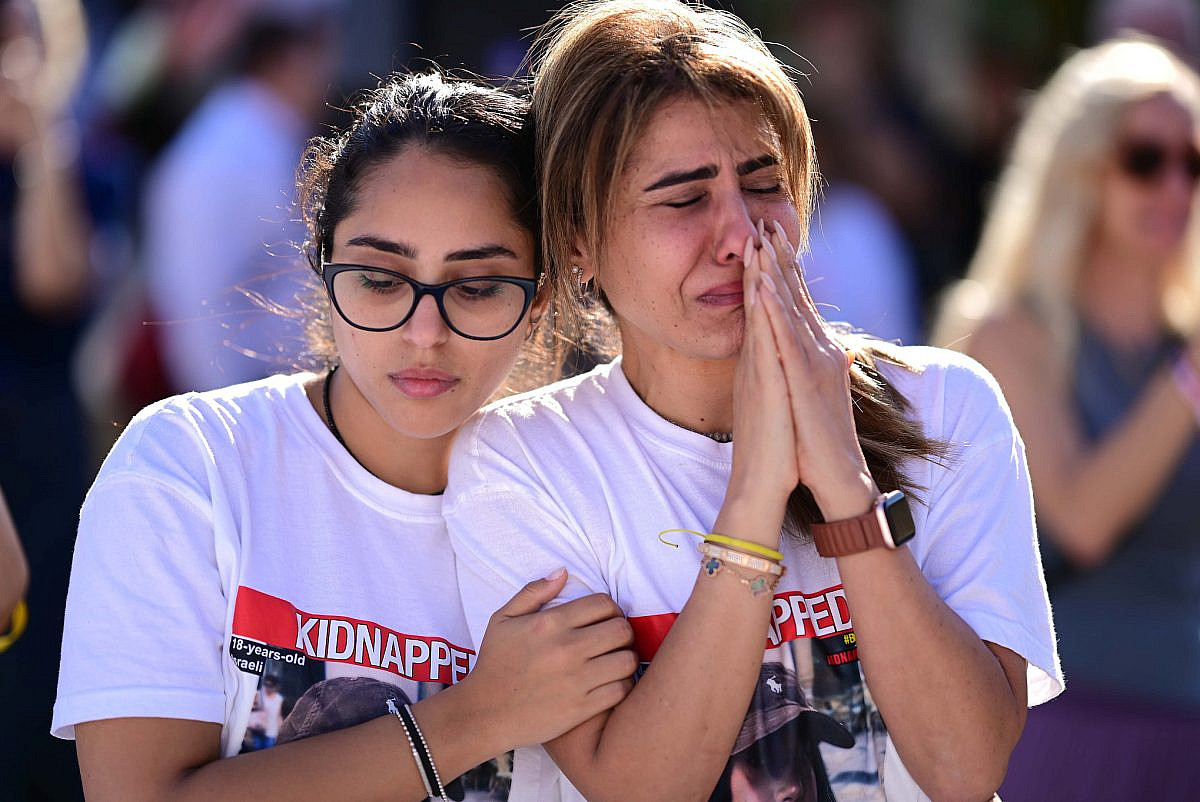There is an awful silence, so loud that it is numbing. It is the silence of frightened people trying to mourn while the war maniacs blast their bombs so they don’t have to hear us, or provide any answers for their failures.
Behind the horrible screens of social media, I see friends abroad being so loud while friends locally sit in silent grief. My soul aches for us, for the silence imposed on us, for the fear of saying very basic human things — as basic as, “Have mercy on the children of Gaza.”
Government ministers have lined up every day for the past two weeks to declare, even to the families of the kidnapped: now is not the time to place blame or to investigate. “Be quiet. We’re at war.”
I keep getting messages from friends all around the globe: “How are you? We know this is an especially heavy moment for you, we’re sending you our love.” What can I answer? We are broken. There is so much grief. Unfolding, ongoing, ancient, personal, political, violent, endless grief.
I think I am writing this article for those who have the capacity to mourn for two peoples. I know I am. And it is a heavy weight.
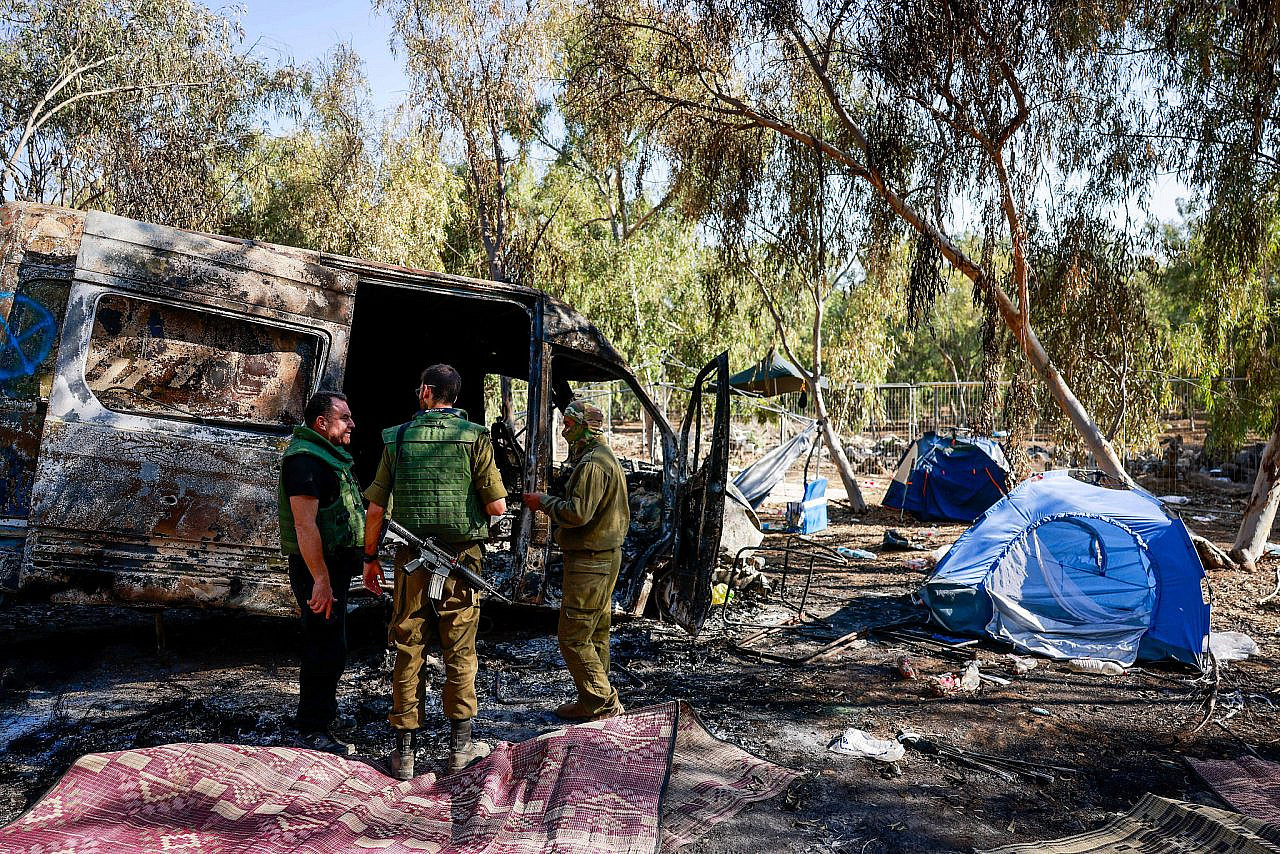
When news of the Hamas attack started spreading on the morning of Oct. 7, we experienced many hours and even days of uncertainty, but we knew something out of the ordinary was happening. We just did not understand how horrific the scale of it was.
The first news I received was about my friend Osnat Trabelsi, an outstanding filmmaker among whose amazing films is “Arna’s Children” — a powerful documentary about the Jenin Freedom Theater and a generation of Palestinian children born into the violence of the occupation. Her nephew was at the music festival in Re’im and was murdered.
The next news was about Vivian Silver, a peace activist and a friend of my mother: she had been kidnapped. Right after that we got word that Hayim Katsman, another peace activist, had been killed as well; he was protecting his neighbor, saving her life as he was murdered guarding the door.
The nightmare kept on going. My friend Moria, a comedy writer, was searching for her cousin who went missing at the festival; after a few hours, she received the devastating news that he, too, had been murdered. The parents of my friend Maoz Inon, an incredible entrepreneur and peace activist, had also been killed in a kibbutz.
More and more names and faces we knew. So many that we stopped counting. It was overwhelming. And on top of that, many of them are people who always stood beside us in the peace and justice community, firmly against aggression and war, actively resisting the occupation.
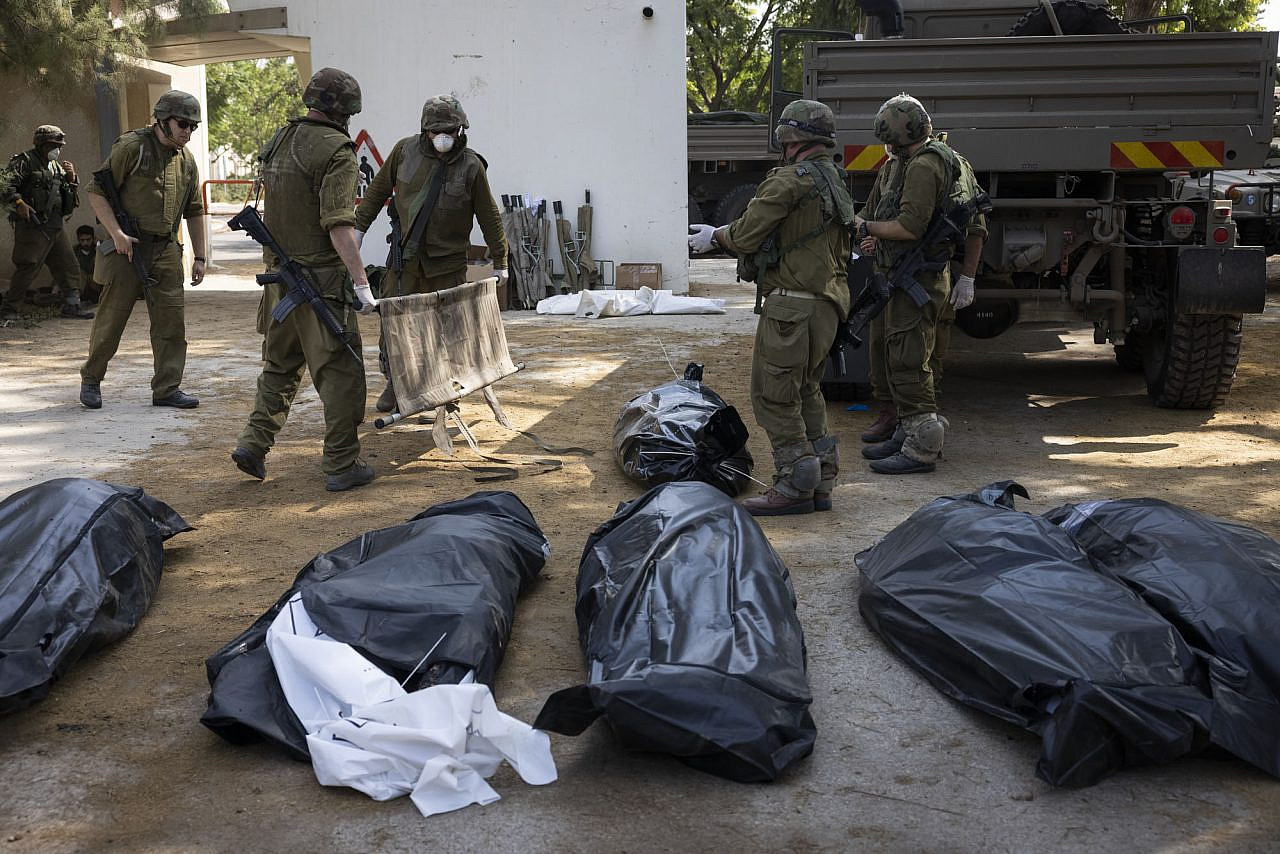
As I write this, a hospital in Gaza has been bombed. Maoz is grieving on the phone and telling me we must do something to stop this madness, that the deaths of his parents can not be used to justify more blood. Our grief has been turned into a senseless revenge campaign in a split second.
A cyber war of narratives plays out over our heads: who bombed the hospital? But the children are already dead, watching us go on stupid Twitter to find out how they died. Miserable. Your war machines killed them, you useless militants, whoever you are.
Can anyone hear us?
I am so proud of my friends who, despite losing family members in the Hamas attack, did not lose their moral compass, immediately using their platform to say clearly: do not use this pain for revenge, or to inflict more pain — that is not the solution. But can anyone hear us?
During her nephew’s shiva (Jewish mourning ritual), Osnat was crying. “It’s like I have two rooms in my heart now,” she said. “One for my personal grief, and one for everyone’s grief. And I don’t want my pain to be used to cause more people grief.”
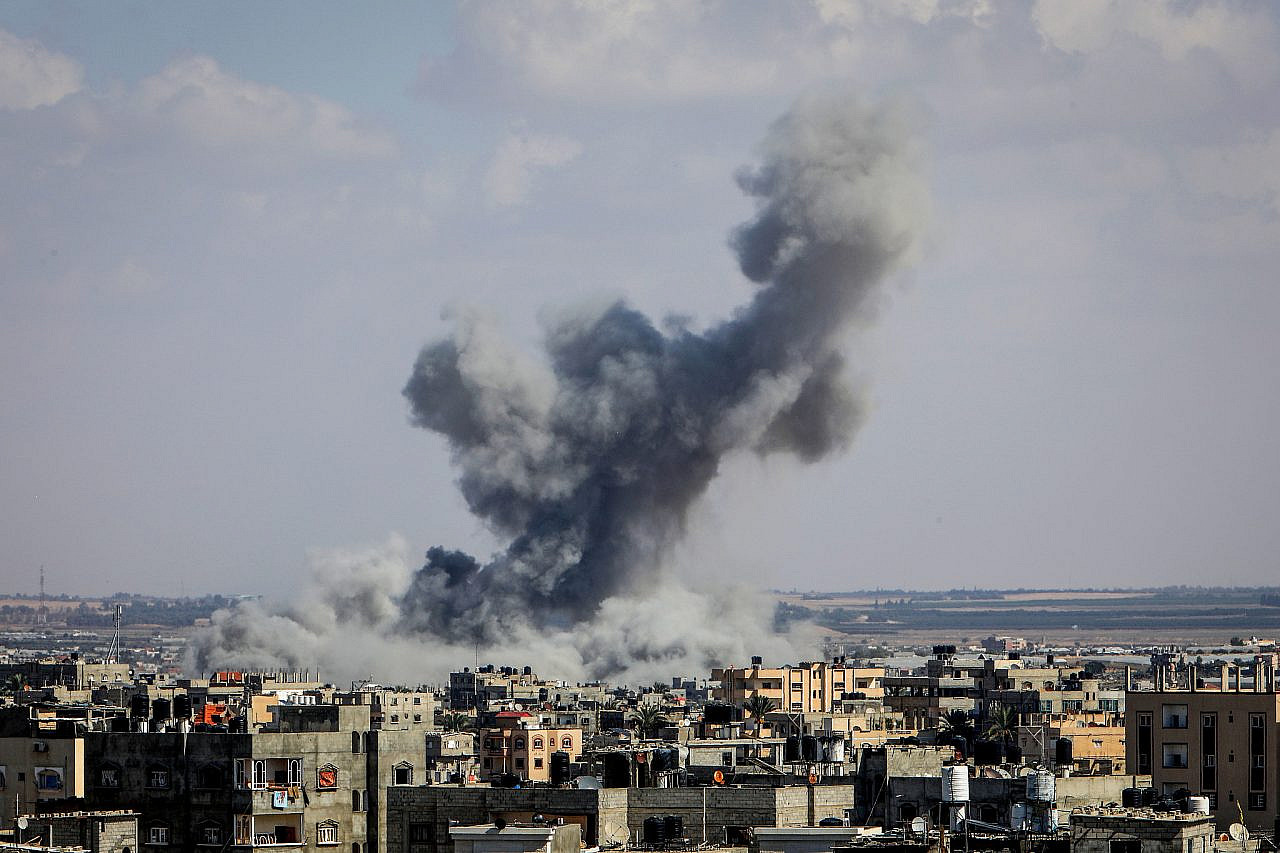
I’ve heard that even the families of the kidnapped are hesitant to criticize the government out of fear that it will disturb the efforts to bring their loved ones back. It is heartbreaking to see videos of heartless people attacking those families at their demonstrations, thinking that their protests will stop the Israeli army from pummeling Gaza. These families received more attention, answers, and warmth from President Biden than from their own leader, our failed leader.
Admitting how deep our pain is — the lonely people who have space to mourn and care for two peoples — is too heavy to bear. It is easier to simply stare at my phone and hope my brain will shut down. But actually my phone is my nightmare; God, Instagram is my nightmare. Who are all these Americans posting from their comfortable homes?
Let go of your phones immediately. Except Bassem Youssef, he can stay; his interview on Piers Morgan’s show was genius. He is trolling the anchor and telling him: “My wife is using my kids as a human shield, Palestinians do that even in my home, it’s crazy!” What a way to deal with dehumanization. Comedians are always so needed during times like these.
Another iconic figure to have come out of the Oct. 7 atrocities is Rachel Edry from Ofakim, who saved her and her husband’s lives through the power of hospitality. A Persian Jew married to a Moroccan, she described in the funniest, most heartbreaking way how for 15 hours she used her expert guest-hosting skills to feed and entertain the Hamas militants who entered her home with song, until the police arrived and freed them.
I am also a comedian, but I am struggling to find anything funny to say. Should I write a joke about the right-wing bigots who always shout “leftist traitors to Gaza!” and say, “Here, you got what you wanted”? No, it’s too soon for that. But Jews have done well with their trauma in the past, so I am sure I will catch up soon — stay tuned.
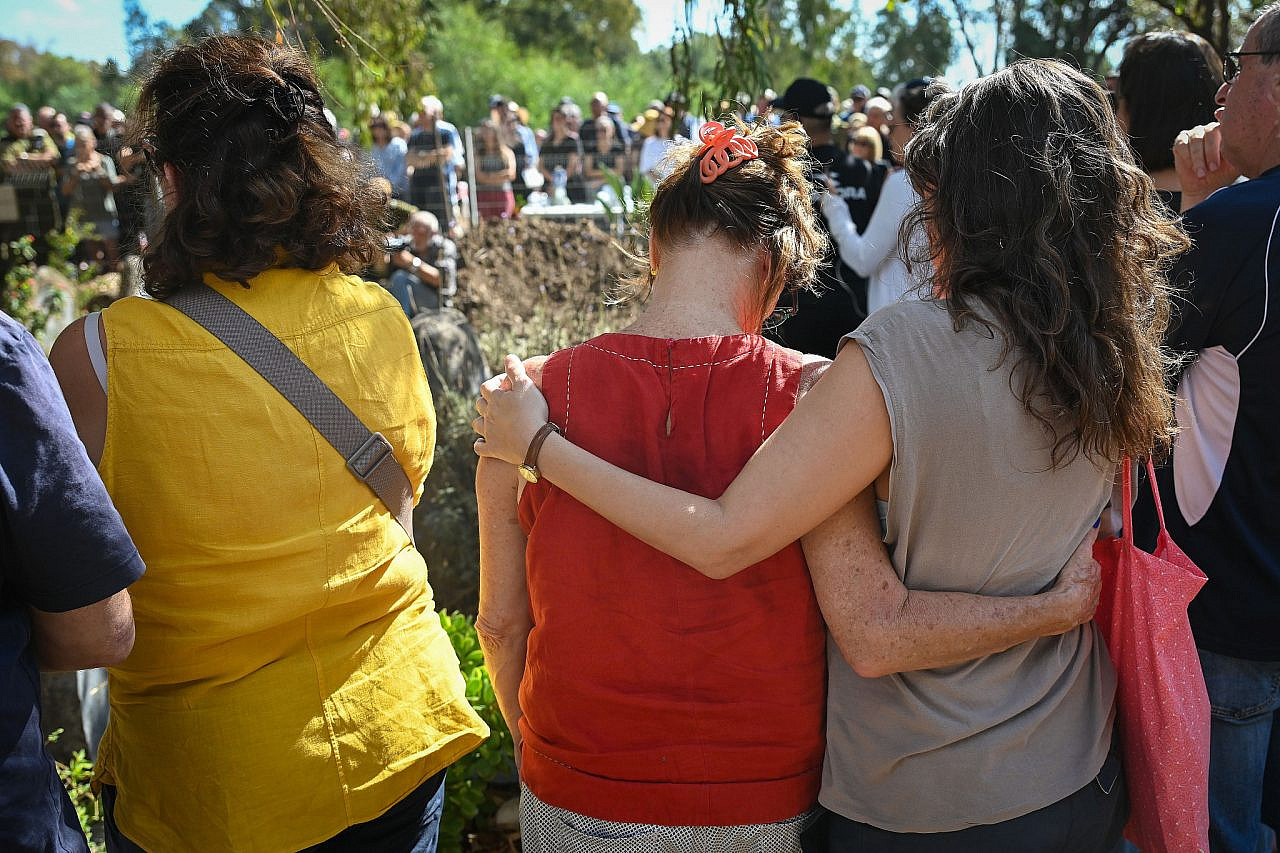
Filling the vacuum
Ministers from our fascist government who try to visit the Israeli survivors are being yelled at and chased away. People are blaming them for what happened. But it is like we do not have a voice, because there is no challenge to how the government is responding. People are too busy with survival.
There is a huge civil force filling the vacuum of the government’s inability to answer the needs of the citizens, including those who were evacuated from the south. I hope they can translate this movement into political power, so we can know exactly who all these amazing people are that sprung into action, and vote for them.
And even though the government is nowhere to be found when we need them, somehow, miraculously, it still has time to arrest hundreds of Palestinian citizens of Israel for sharing or liking a post on social media that expresses sympathy with the people of Gaza. And when two activists in Jerusalem from the Standing Together movement hung posters saying “Jews and Arabs will overcome this together” in Hebrew and Arabic, they were detained, their posters confiscated by police. The state can, it seems, function when it wants to.
In leftist social media groups, friends are warning each other that right-wing bigots are doxxing leftists and inciting violence against them — as we saw with prominent left-wing journalist Israel Frey, who is now in hiding due to threats against him and his family. The fear is numbing.
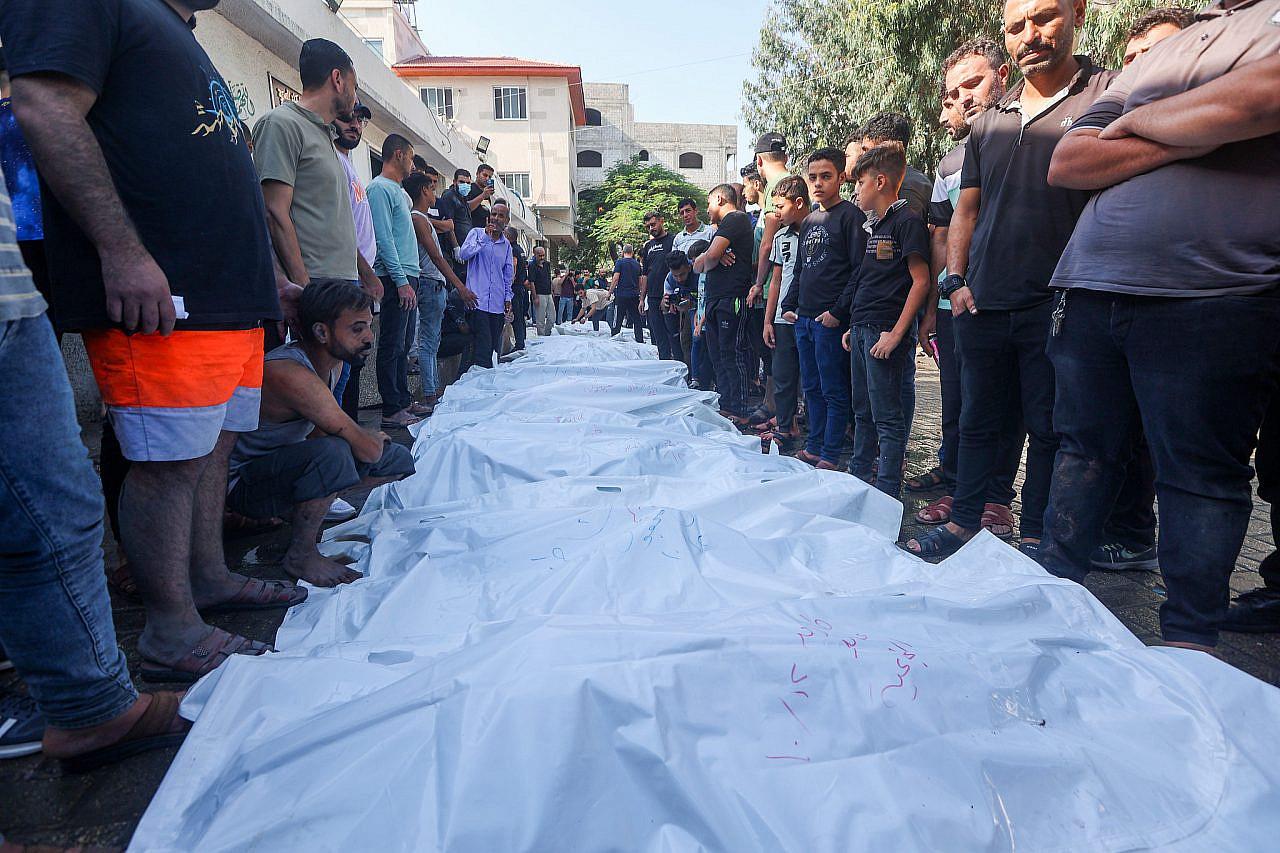
Can I ask you for something? Can you check on your friends who live in Israel-Palestine before posting on social media? Because we are not OK. We are broken.
Why do I say “we”? Because I do not want to feel alone. Yes, I knew some of the people murdered, and I know some of the people kidnapped. But I, compared to others, am relatively OK. No, I am lying to myself. What is OK? No one is OK.
I am trying to put the pain down on paper. I am not doing it very well because every few moments I get another message about another person we knew who is gone. And the sad truth is that in the name of this pain, our government is carrying out atrocities on people who had nothing to do with it.
Alone in our grief
When people experience a great deal of grief, they usually also feel shame and anger that they need to channel somewhere. People’s capacity to see beyond their wounds and pain is limited. We need recognition, compassion, solidarity, and a voice. By having a voice, you feel like you have agency. By having agency, you are able to imagine taking action. And when that action is tangible, you get the sense that you might actually be able to influence the situation and help your loved ones.
Wow, I’m so happy I wrote that. But the truth is that the amount of grief here from what happened that day is so huge that I am not sure I or people like me have a voice anymore. I feel so numb and scared I can actually hear the silence in my friends’ voices without even speaking to them.
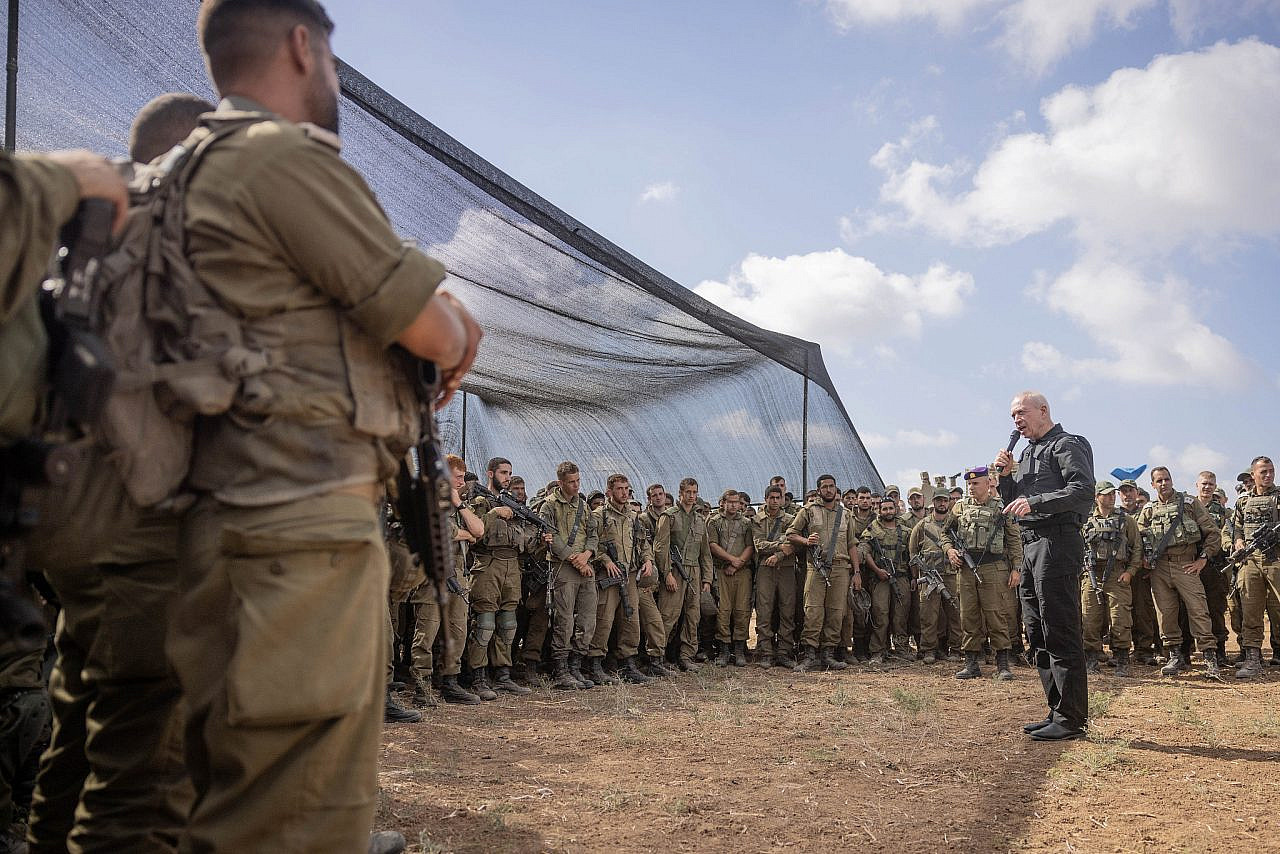
Both peoples are retreating inward right now, and it is extremely difficult for those of us who are trying to hold the pain of everybody grieving. Our mental, emotional, and political space is shrinking all at once. I am torn in pieces. I am sure many of you are too.
There is a lot of death, displacement, and horror unfolding in this moment, and not much hope to offer. But I will say this: it is OK to acknowledge that we felt abandoned for a moment, alone in our grief. The scale of the violence that hit us was nothing like anything we had experienced before. It is OK to sit with your grief and not have answers or be active all the time. I wish I had told that to myself straight away, but instead I was immediately a participant in the cyber war madness. What a mistake for my mental health and my close relationships. I’m so sorry.
Most read on +972
What else can you do? Check in with people you love. Read only trusted sources. Put pressure on your elected officials to push for an immediate ceasefire. Be with the people who comfort you the most. And give support to people who see you, amplify you, and make you feel safe.
I have a lot of love in my heart, and grief, compassion, and a desire for change. Each of us has a different role, locally and globally. And while my political space is shrinking, no one can shrink my imagination. So I will use it to hold onto the hope that the fire will cease immediately and we will start picking up the pieces.

